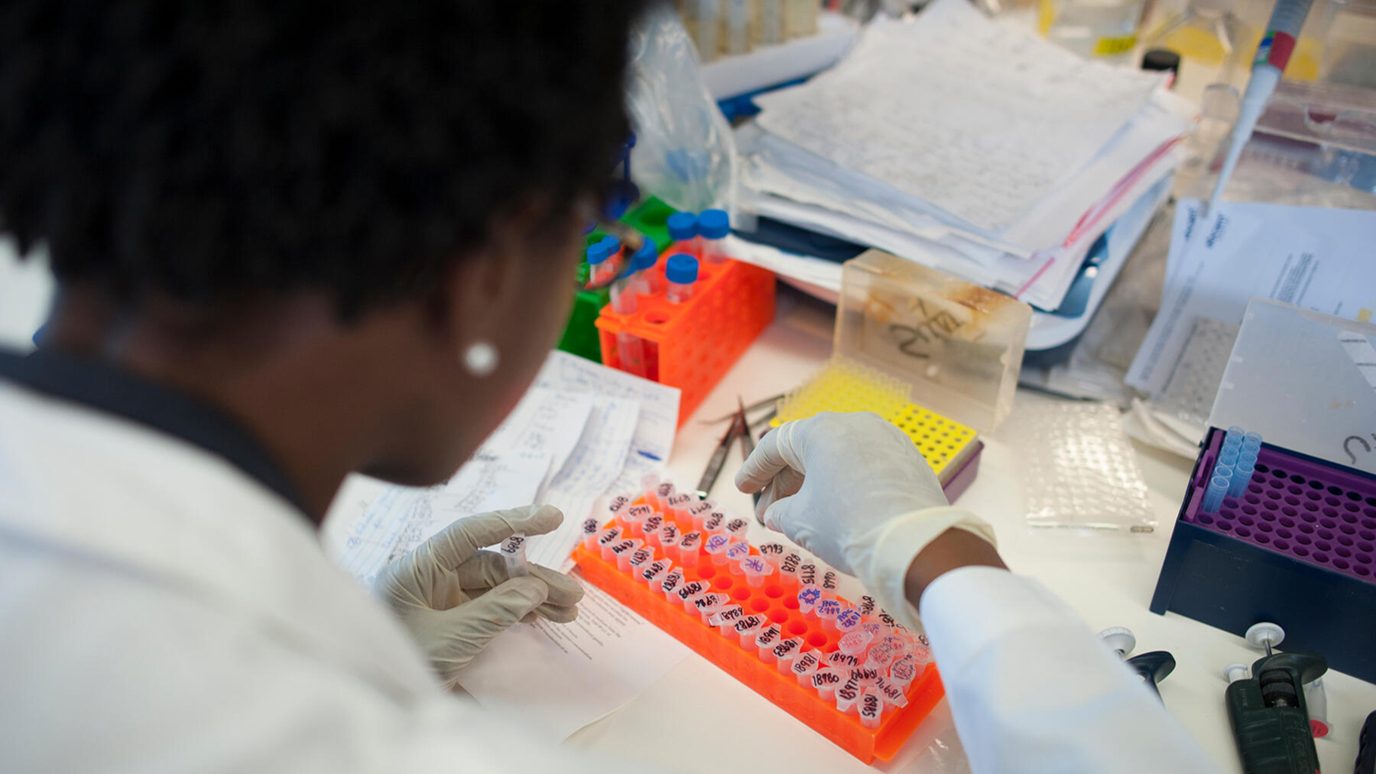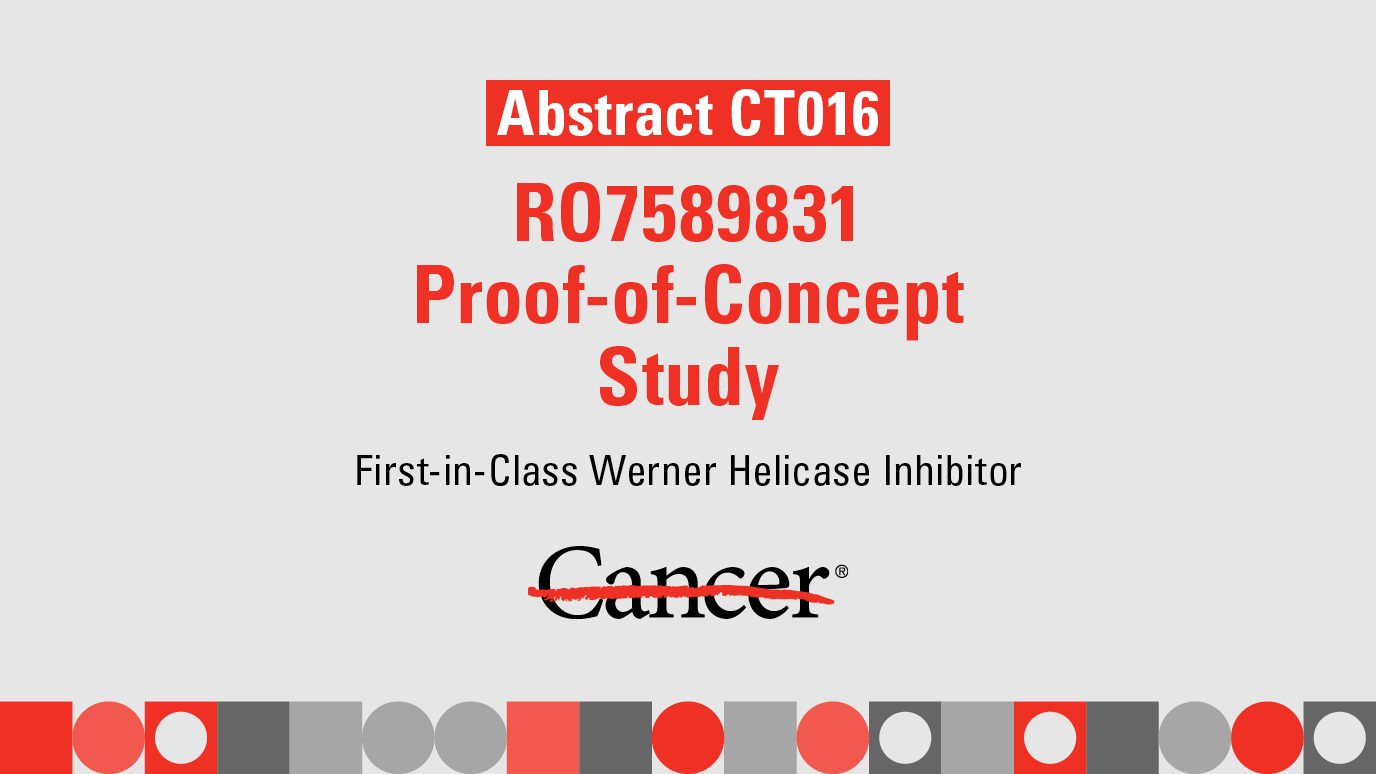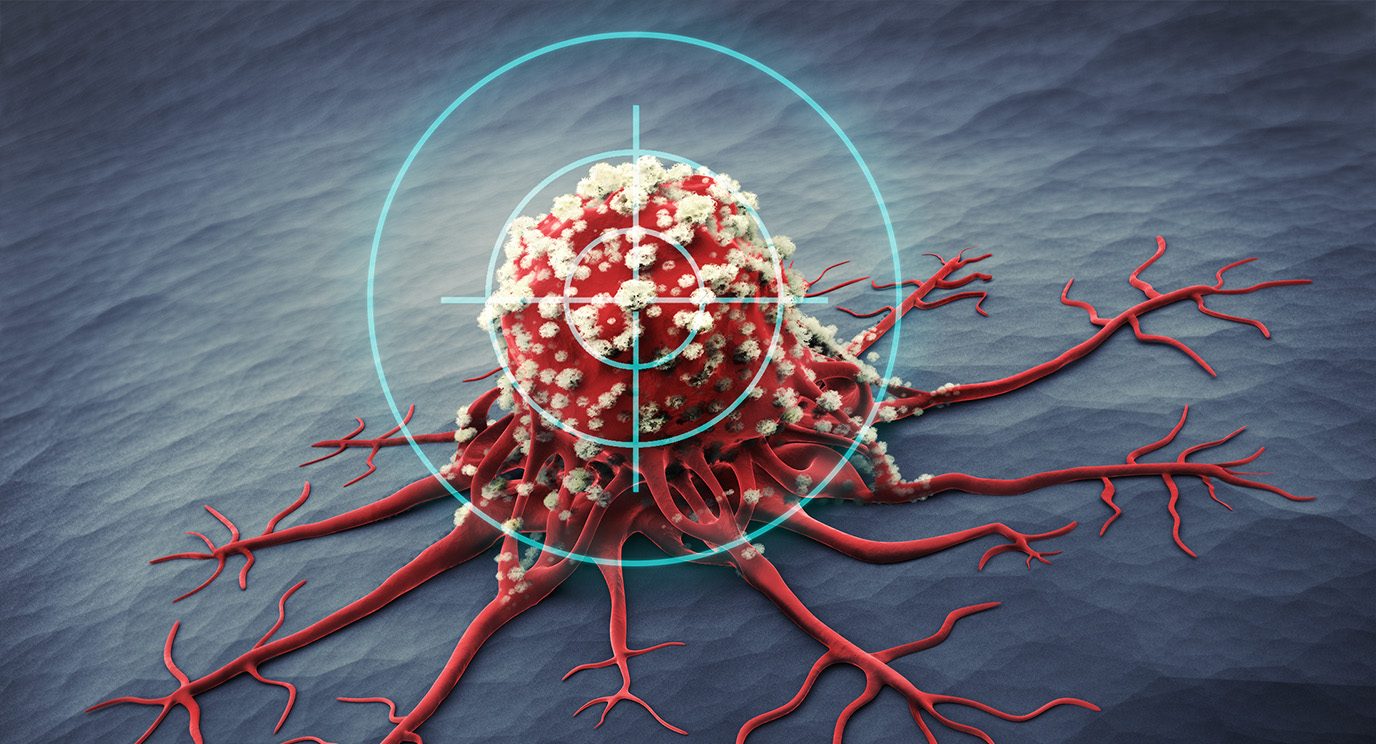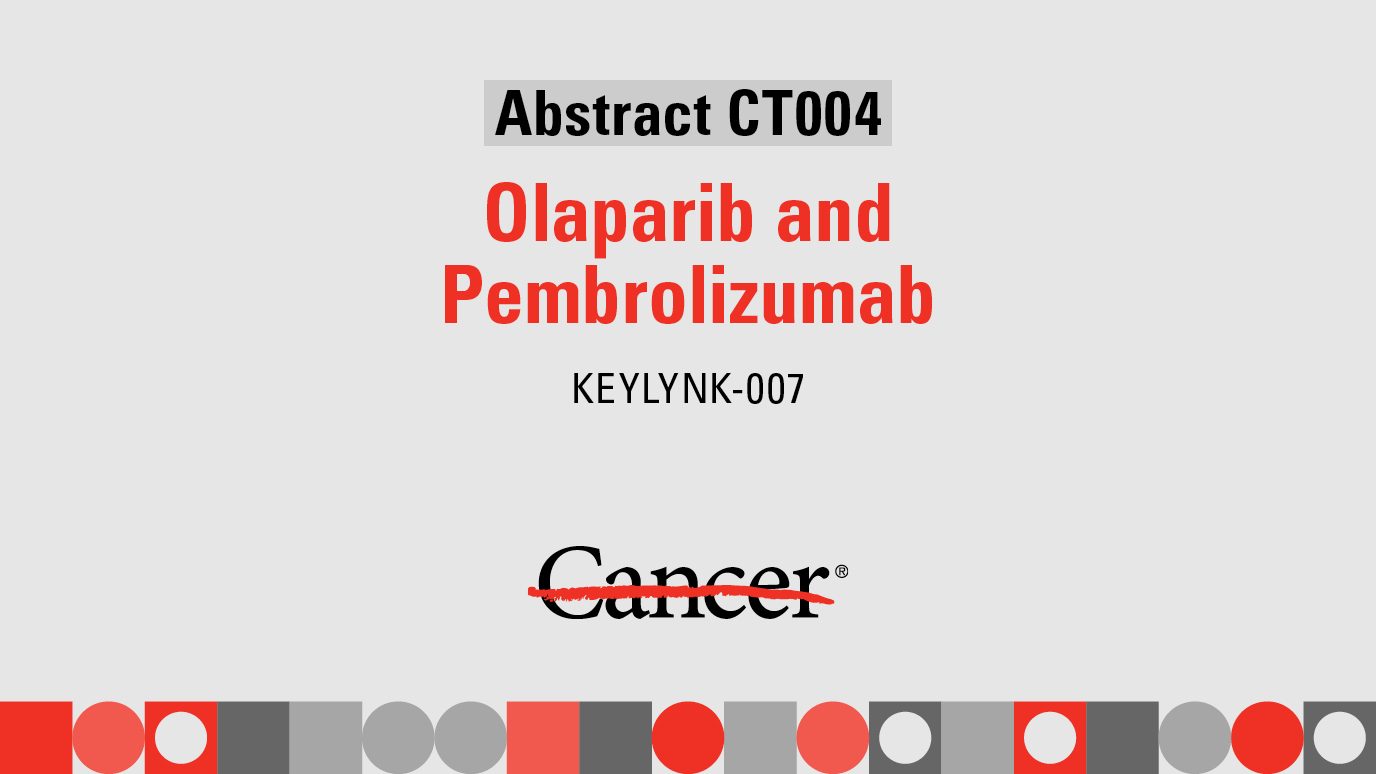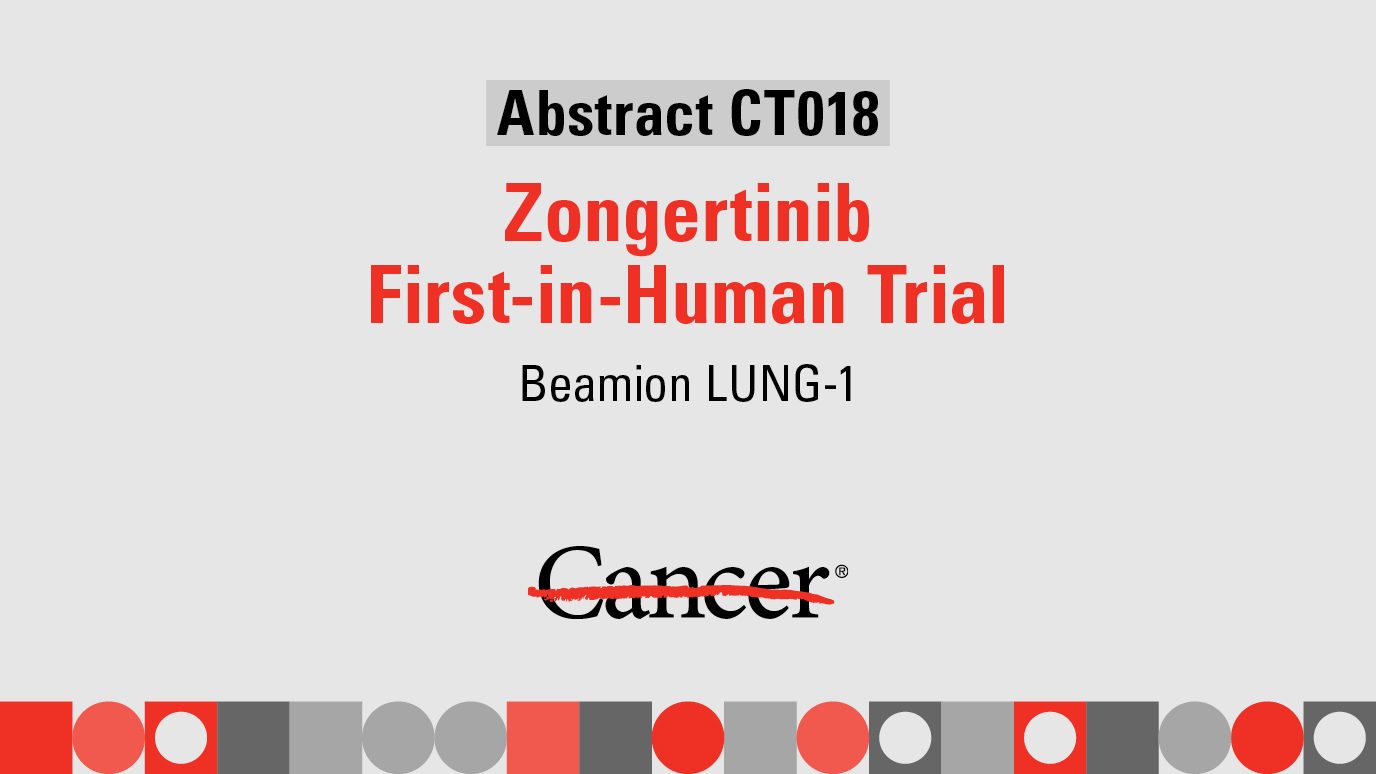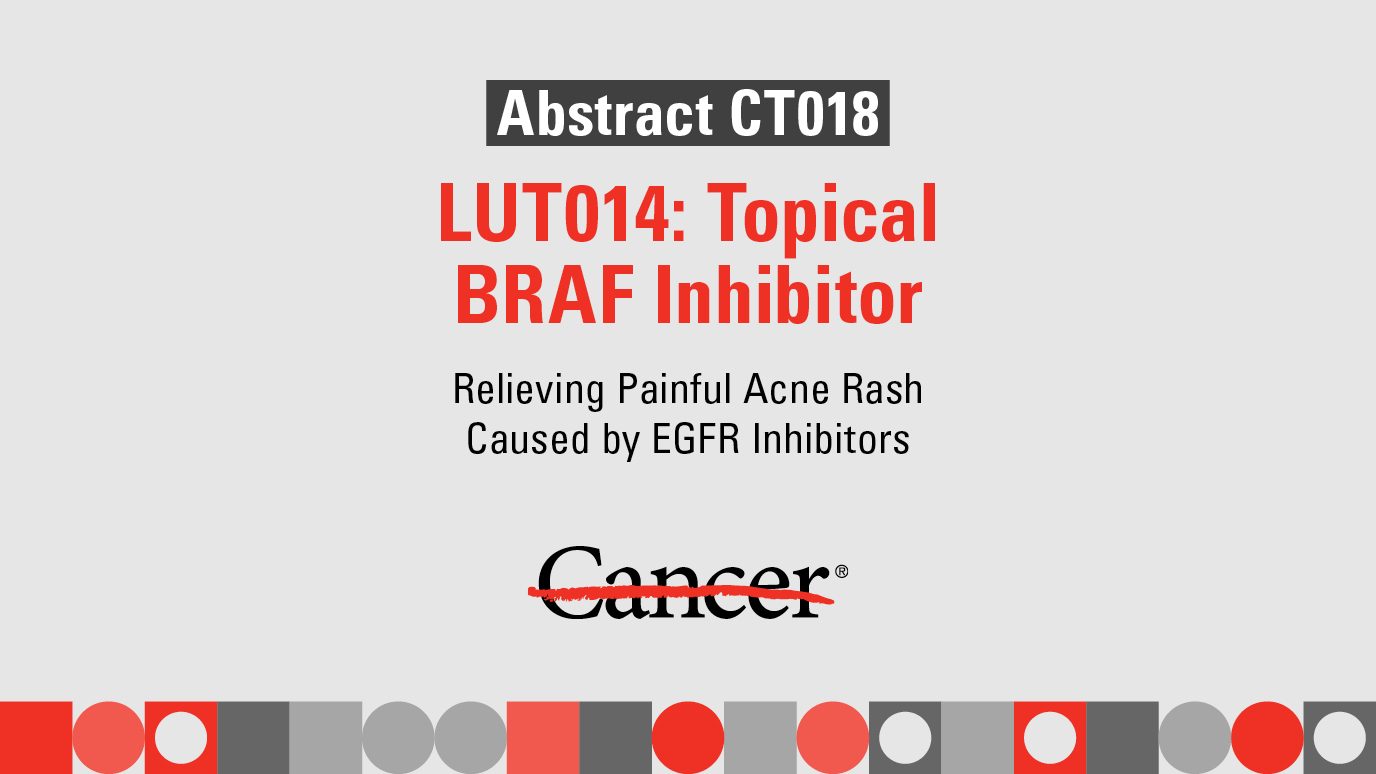At the core of MD Anderson’s approach to exceptional patient care is a virtuous cycle of innovation that's grounded in collaboration, connectivity and data-based science. Our unique environment and vast resources accelerate novel concepts faster than ever before by offering leading scientific minds close proximity to our clinics to ease collaboration with our renowned clinicians and our patient partners.
At the American Association for Cancer Research Annual Meeting, our experts showcase their pacesetting research and join colleagues from across the globe for discussion on the latest advances in cancer science.
Below are highlights from our presentations, details about onsite networking opportunities with our experts and information on open research positions at MD Anderson.
Featured Articles
Featured Abstract
HER2 targeted therapy shows promise in previously treated lung cancers
New data presented by John Heymach, M.D., Ph.D., at AACR 2025 demonstrated promising results and a manageable safety profile for zongertinib, an oral HER2-targeted therapy for patients with HER2-mutant non-small cell lung cancer. Data from this trial prompted a priority review of zongertinib by the FDA earlier this year and initiated a Phase II trial comparing it to the current standard of care.
Featured Podcast
Navigating skin side effects of targeted cancer therapy
Epidermal Growth Factor Receptor (EGFR) inhibitors are effective treatments for certain cancers, such as lung and colorectal cancer. However, they frequently cause skin-related side effects that can impact patient quality of life and adherence to treatment. Anisha Patel, M.D., and Christine Parseghian, M.D., discuss why these skin side effects occur, introduce a potential new treatment option, and share practical tips to help patients manage them. Learn more about this episode and other podcast episodes

Meet the Experts
Visit us at Booth 2527 to discuss hot topics and emerging trends with leading minds in cancer science.
Exhibit Hall Hours
Sunday, April 27: noon–5 p.m.
Monday, April 28: 9 a.m.–5 p.m.
Tuesday, April 29: 9 a.m.–5 p.m.
Wednesday, April 30: 9 a.m.–noon
Barista-crafted coffee available at the booth during all hours of the exhibit hall.
Sunday, April 27
12:30–1 p.m.
Interventions for adverse effects of EGFR inhibitors

Anisha Patel, M.D.
Associate Professor, Dermatology
2–2:30 p.m.
Clinical Trials at MD Anderson

Christopher Flowers, M.D.
Division Head, Cancer Medicine

Jennifer Litton, M.D.
Vice President, Clinical Research
Professor, Breast Medical Oncology
2:30–3 p.m.
Student Opportunities at MD Anderson

Adam Grippin, M.D., Ph.D.

Jillian Gunther, M.D., Ph.D.
Program Director, Med Students SOAR and RADAR

Marites Melancon, Ph.D.
Program Director, Med Students SOAR

Vickie Shannon, M.D.
Professor, Pulmonary Medicine
3–3:30 p.m.
Spatialomics: Mapping the Tumor Ecosystem

Anirban Maitra, M.B.B.S.
Professor, Pathology and Translational Molecular Pathology

Linghua Wang, M.D, Ph.D.
Associate Professor, Genomic Medicine

Di Zhao, Ph.D.
Assistant Professor, Experimental Radiation Oncology
3–3:30 p.m.
Cancer Vaccines: The Current Landscape

Eduardo Vilar-Sanchez, M.D., Ph.D.
Chair ad interim, Clinical Cancer Prevention

Jason Willis, M.D., Ph.D.
Assistant Professor, Gastrointestinal (GI) Medical Oncology
Monday, April 28
Noon–12:30 p.m.
Institute for Cell Therapy Discovery & Innovation

Cathy Dumbrava, M.D.
Assistant Professor, Investigational Cancer Therapeutics

Katy Rezvani, M.D., Ph.D.
Vice President and Head, Institute for Cell Therapy Discovery & Innovation
Professor, Stem Cell Transplantation & Cellular Therapy
Noon–1 p.m.
Career Opportunities at MD Anderson

Giulio Draetta, M.D., Ph.D.
Chief Scientific Officer
Professor, Genomic Medicine
1–1:30 p.m.
Cancer Neuroscience: An Emerging Integrative Field

Jian Hu, M.D.
Associate Professor, Cancer Biology
2–2:30 p.m.
Genotyping: A New Frontier in Early Cancer Detection and Risk Profiling

Paul Scheet, Ph.D.
Professor and Chair, Epidemiology
2–2:30 p.m.
Advances in Non-Small Cell Lung Cancer

Tina Cascone, M.D., Ph.D.
Associate Professor, Thoracic/Head and Neck Medical Oncology
4–4:30 p.m.
Accelerating Drug Discovery with AI

Bissan Al-Lazikani, Ph.D.
Co-Lead, Institute for Data Science in Oncology
Director of Therapeutics Data Science
Professor, Genomic Medicine

Tim Heffernan, Ph.D.
Vice President, Oncology Research
Tuesday, April 29
Noon–12:30 p.m.
Functional Proteomics: Revealing the Role of Protein in Tumor Development

Yiling Lu, M.D.
Professor, Genomic Medicine
Director, Functional Proteomics RPPA Core
1–2 p.m.
The Postdoctoral Experience at MD Anderson

Jian Hu, M.D.
Associate Professor, Cancer Biology

Ankita Paul, Ph.D.
Postdoctoral Fellow, Biostatistics and Computational Biology

Vicente Rodrigues Marczyk, M.D., Ph.D.
Postdoctoral Fellow, Endocrine Neoplasia & Hormonal Disorders

Aria Vaishnavi, Ph.D.
Assistant Professor, Genetics
2:30–3 p.m.
Synthetic Lethality and DDR Inhibitor Clinical Trials

Timothy Yap, M.D., Ph.D.
Professor, Investigational Cancer Therapeutics
Vice President, Therapeutics Discovery Division
Associate Director of Translational Research, Khalifa Institute for Personalized Cancer Therapy
3–3:30 p.m.
The Next Chapter in Cell Therapy Discoveries

Samer Srour, M.B.Ch.B.
Assistant Professor, Stem Cell Transplantation and Cellular Therapy
Our research by the numbers
$1.3B
invested in research
1,556
clinical trials
188
patents awarded
From Sept. 1, 2023 to Aug. 31, 2024
Education and Training at MD Anderson
MD Anderson academic programs are competitive and comprehensive. We offer educational opportunities from undergraduate degrees to postdoctoral training.
More AACR News
AACR: Researchers share promising results from MD Anderson clinical trials
ABSTRACTS: CT012, CT132, CT265
Researchers from The University of Texas MD Anderson Cancer Center will present promising results from clinical trials in three minisymposia abstracts at the American Association for Cancer Research (AACR) Annual Meeting 2025. Findings include a personalized vaccine combination therapy for colorectal cancer, the use of radiotherapy to avoid the toxicities of systemic treatments for kidney cancer, and engineered exosomes to silence mutant KRAS in pancreatic cancer.
In addition to these trials, forthcoming press releases will feature notable oral and plenary session abstracts. More information on all MD Anderson AACR Annual Meeting content can be found at MDAnderson.org/AACR.
Personalized vaccine with or without immunotherapy is safe for patients with metastatic colorectal cancer subtype (Abstract CT012)
Patients with microsatellite-stable metastatic colorectal cancer (MSS mCRC) have poor outcomes and limited treatment options after failure of standard chemotherapy, in part because of an immunologically “cold” tumor microenvironment. Researchers led by Saurav Daniel Haldar, M.D., and Michael Overman, M.D., developed a personalized vaccine platform called NeoAg-VAX that uses bioinformatics and sequencing tools to deliver up to 10 tumor-derived proteins targeted to each patient’s specific combination of mutations. In this Phase I feasibility study, the researchers combined the personalized vaccine with and without pembrolizumab immunotherapy in 28 patients with MSS mCRC. The personalized vaccine was safe and feasible to administer, leading to strong immune responses in most patients vaccinated on this study. The researchers also characterized immune cell composition within patients' tumors, providing molecular insights into the immune microenvironment that could inform future therapeutic approaches. Haldar will present the results April 27.
Metastasis-directed radiation therapy avoids toxicities of systemic therapy in patients with clear cell renal cell carcinoma (Abstract CT132)
Systemic therapies used for patients with metastatic clear cell renal cell carcinoma (ccRCC), such as immunotherapy and tyrosine kinase inhibitors, are associated with high toxicity rates. Metastasis-directed radiation therapy may limit side effects, but there are no established biomarkers to identify patients most likely to respond. Therefore, researchers led by Chad Tang, M.D., and Pavlos Msaouel, M.D., Ph.D., conducted a Phase II prospective trial investigating metastasis-directed therapy without systemic therapy in 121 patients with oligometastatic ccRCC. The median progression-free survival (PFS) was 18 months, with a median of 34 months systemic therapy-free survival (STFS). Importantly, overall survival (OS) was not compromised, with OS rates of 94% and 87% at two and three years, respectively. The researchers also tested a novel tumor-informed circulating tumor DNA (ctDNA) assay to detect molecular residual disease (MRD). Patients who were MRD- versus MRD+ at baseline had median STFS of 54 months compared to 27 months. These findings show that metastasis-directed radiation therapy can help patients avoid systemic therapies without compromising outcomes and that the ctDNA assay is a useful personalized prognostic biomarker for response. Tang will present the results April 28.
Exosomes deliver gene silencers for KRAS G12D pancreatic cancer (Abstract CT265)
KRAS G12D mutations occur in over 40% of pancreatic cancer cases, but KRAS inhibitors have not yielded durable responses for patients, partly due to an immunosuppressive tumor microenvironment. Exosomes are small extracellular vesicles that can be engineered to carry small interfering RNA (siRNA), which silence specific genes, into cancer cells. In a first-in-human Phase I dose escalation trial, researchers led by Valerie LeBleu, M.D., Ph.D., Shubham Pant, M.D., Elizabeth Shpall, M.D., and Brandon Smaglo, M.D., examined the use of engineered exosomes derived from bone marrow cells to silence KRAS G12D in 12 patients with metastatic pancreatic cancer. Six of the 12 patients receiving all exosome doses had stable disease in target lesions, and there were no dose-limiting toxicities. The researchers noted a reduction in KRAS G12D circulating DNA post-treatment. Further in vivo analysis revealed that these exosomes would work well with immune checkpoint blockade to reprogram the tumor microenvironment and overcome treatment resistance, highlighting the combination as a potential therapeutic strategy being investigated in an upcoming Phase II trial. LeBleu will present the results April 29.
In addition, Abstract CT267 features early clinical trial data from the ATR kinase inhibitor, ART0380, in advanced solid tumors. This targeted therapy was initially discovered and developed by MD Anderson’s Therapeutics Discovery division and licensed to Artios Pharma. Preclinical and translational studies led by investigators at MD Anderson, published in Clinical Cancer Research, demonstrated potent antitumor activity and established an innovative approach to optimize patient selection based on molecular tumor features.
AACR: MD Anderson’s John Weinstein elected Fellow of the AACR Academy
CHICAGO ― John N. Weinstein, M.D., Ph.D., chair of Bioinformatics and Computational Biology and professor of Systems Biology at The University of Texas MD Anderson Cancer Center, has been elected to the 2025 class of Fellows of the American Association for Cancer Research (AACR) Academy in recognition of decades of combined laboratory and computational work pioneering multi-omic molecular profiling, including the introduction of new laboratory techniques, clustered heat maps, and early innovations in artificial intelligence for cancer drug discovery.
The mission of the AACR Academy is to honor distinguished scientists whose contributions have propelled significant progress and breakthroughs against cancer. Weinstein is part of a select cohort of 33 distinguished scientists, rigorously reviewed and chosen by the AACR Academy for their exceptional contributions driving innovation and progress against cancer.
Weinstein joins 15 previously elected fellows from MD Anderson, including current members, James P. Allison, Ph.D., Neal G. Copeland, Ph.D., Ronald A. DePinho, M.D., Andy Futreal, Ph.D., Nancy A. Jenkins, Ph.D., Margaret L. Kripke, Ph.D., Guillermina (Gigi) Lozano, Ph.D., Helen Piwnica-Worms, Ph.D., Padmanee Sharma, M.D., Ph.D., and Louise C. Strong, M.D. Former members, now deceased, include Isaiah J. Fidler, D.V.M., Ph.D., Emil J Freireich, M.D., Waun Ki Hong, M.D., V. Craig Jordan, Ph.D., and John Mendelsohn, M.D.
“Dr. Weinstein has made substantial contributions to advancing our knowledge of the molecular profiles of cancer, and we celebrate his recognition as a Fellow of the AACR Academy,” said Peter WT Pisters, M.D., president of MD Anderson. “His crucial data science work includes the creation of countless analytical tools that help translate breakthrough discoveries into clinical advances that improve the lives of patients.”
Weinstein earned a B.A. in Biology, a Ph.D. in Biophysics and an M.D. from Harvard University, and he completed his internship and residency in Medicine at Stanford University. Throughout his career, he led hybrid laboratory and computational research groups, and, since the early 1990s, he has focused on integrative multi-omic studies and issues of data quality control. At the National Cancer Institute (NCI), he headed the Genomics and Bioinformatics Faculty and a computational Immunology section.
Since 1991, Weinstein’s research has focused on molecular profiling of cancer with an emphasis on drug discovery. In 1992, he began characterizing the NCI-60 human cancer cell lines at the DNA, RNA, protein and epigenomic levels – the first large multi-omic profiling project – which provided a design template for the Cancer Cell Line Encyclopedia and Genomics of Drug Sensitivity in Cancer projects, as well as contributing to some major aspects of The Cancer Genome Atlas (TCGA) project and its descendants.
One of Weinstein’s many analytical tools, the color-coded clustered heat map (CHM), provides an intuitive visualization of patterns in complex biological data. This tool led to the clinical development of oxaliplatin, a chemotherapy drug that has become a standard component of treatment for colorectal, pancreatic and other cancers. The CHM became a ubiquitous form for visualization of -omics data, and Weinstein is now introducing artificial intelligence to improve its characteristics as a dynamically interactive next-generation CHM.
His work overall has contributed to the “Findable, Accessible, Interoperable and Reusable (FAIR)” principles of Data Science, established guidelines for managing and sharing research data to maximize their potential value and facilitate discovery.
“Dr. Weinstein is an exemplary leader in the field of bioinformatics, and his discovery work has generated tremendous lasting benefits for the scientific community,” said Giulio Draetta, M.D., Ph.D., chief scientific officer at MD Anderson. “We are proud to have him as part of our MD Anderson research community, and he joins an incredible group of scientists in the AACR Academy.”
In 2008, Weinstein was recruited to MD Anderson to build the Department of Bioinformatics and Computational Biology, which he still chairs. He also serves as a scientific advisor to MD Anderson’s Proteomics, Functional Proteomics Reverse Phase Protein Array (RPPA), Metabolomics and Single Cell Genomics Cores. Since 2009, he has been a principal investigator of MD Anderson’s NCI Genome Data Analysis Center, and he served for 18 months as chair of the NCI TCGA Network Steering Committee. He is a founding affiliate member of MD Anderson’s Institute for Data Science in Oncology and serves as director of the Bioinformatics Shared Resource.
Weinstein was awarded the Hubert L. Stringer Chair for Research in 2015 and has received STARS and STARS-PLUS awards from The University of Texas at Austin, as well as a Cancer Prevention and Research Institute of Texas (CPRIT) Core Grant for proteomics and metabolomics. He has received generous funding from The Mary K. Chapman Foundation and Michael and Susan Dell Foundation. With more than 400 publications – including 14 first-author publications in Science or Nature – and over 150,000 literature citations, Weinstein was recognized as “a highly cited researcher of the decade” by the Web of Science in 2020.
More information on all MD Anderson AACR Annual Meeting content can be found at MDAnderson.org/AACR.
AACR: Five MD Anderson researchers honored with 2025 Scientific Achievement Awards
Five scientists from The University of Texas MD Anderson Cancer Center will be recognized with Scientific Achievement Awards and honors at the American Association for Cancer Research (AACR) Annual Meeting 2025. These awards highlight significant achievements in translational research and oncology leadership from both early career and internationally renowned scientists and clinicians.
The honors include:
AACR-Daniel D. Von Hoff Award for Outstanding Contributions to Education & Training in Cancer Research: Robert Bast, M.D.
AACR-Princess Takamatsu Memorial Lectureship: Ronald DePinho, M.D.
AACR-Minorities in Cancer Research Jane Cooke Wright Lectureship: Christopher Flowers, M.D.
AACR-Award for Outstanding Achievement in Basic Cancer Research: Han Liang, Ph.D.
NextGen Star for the AACR Annual Meeting 2025: Di Zhao, Ph.D.
“Congratulations to our distinguished researchers who represent an extraordinary group of scientists committed to exceptional discovery, translational and clinical research,” said Peter WT Pisters, M.D., president of MD Anderson. “We celebrate your contributions and look forward to our continued work driving transformative advances and creating tremendous impact for patients.”
AACR-Daniel D. Von Hoff Award for Outstanding Contributions to Education & Training in Cancer Research
Robert Bast, M.D., professor of Experimental Therapeutics, is a pre-eminent pioneer and authority on cancer biomarkers and translational research. His research led to the discovery of CA-125 as a biomarker for ovarian cancer, contributing to the care of hundreds of thousands of women worldwide. This award recognizes Bast for impacting hundreds of young scholars through innovative programs of education and mentoring for physician-scientists, clinician-investigators, fellows, graduate students and research administrators. He serves as director of Translational Research Career Development, coordinating MD Anderson’s physician-scientist and K12 clinician-investigator training programs. Of the 45 graduates of the physician-scientist program, 87% earned their first individual investigator grant or equivalent to launch their respective careers. Among the 33 graduates of the K12 clinician-investigator program, 13 have gone on to conduct practice changing clinical trials.
AACR-Princess Takamatsu Memorial Lectureship
Ronald DePinho, M.D., professor of Cancer Biology and Fellow of the AACR Academy, is recognized for his work to uncover the genetic and biological mechanisms governing cancer, particularly the role of telomere biology in cancer and aging. Utilizing innovative genetically engineered models, he elucidated the basis for the preponderance of epithelial cancers in the aged, resistance mechanisms enabling KRAS-independent cancer growth, and the role of telomeres in driving genomic instability and age-associated degenerative diseases. He demonstrated that aging is reversible. DePinho will present his award lecture April 27.
AACR-Minorities in Cancer Research Jane Cooke Wright Lectureship
Christopher Flowers, M.D., division head of Cancer Medicine and chair of Lymphoma/Myeloma, is recognized worldwide as a leader in lymphoma clinical and population science who has made seminal contributions to the field. Through his research, he has uncovered disparities in the presentation and outcomes for lymphoid cancers. Flowers also led cohort studies that enhanced the understanding of risk models and outcomes for lymphoma patient populations. In parallel, he has served as a mentor to many scientists among the next generation of cancer investigators. Flowers will present his award lecture April 28.
AACR-Award for Outstanding Achievement in Basic Cancer Research
Han Liang, Ph.D., professor of Bioinformatics and Computational Biology, is recognized for his significant contributions to advancing cancer genomics through pioneering pan-cancer analyses, contributing to personalized cancer therapies and the broader field of cancer bioinformatics and systems biology. He also developed widely utilized bioinformatics tools, such as The Cancer Proteome Atlas and TANRIC, an open-access resource for interactive exploration of long noncoding RNAs (lncRNAs) in cancer. Liang’s work has uncovered critical roles of A-to-I RNA editing and systematically identified tumor-intrinsic and tumor-microenvironment vulnerabilities. Liang will present his award lecture April 28.
NextGen Star for the AACR Annual Meeting 2025
Di Zhao, Ph.D., assistant professor of Experimental Radiation Oncology, has garnered significant recognition for her contributions to the field of prostate cancer. Combining state-of-the-art genetically engineered laboratory model systems and single-cell multi-omics, her research successfully characterized several therapeutic targets and combinatorial strategies for advanced prostate cancer. Notably, Zhao has built long-term collaborations with translational scientists and genitourinary oncologists at MD Anderson and contributed to translating her basic research from bench to bedside. Zhao will present her work April 27.
“We are pleased to see AACR recognizing so many of our researchers, which is a testament to our institution’s unique research ecosystem and commitment to groundbreaking science,” said Giulio Draetta, M.D., Ph.D., chief scientific officer at MD Anderson. “The achievements of our honorees inspire us as we continue to pursue more breakthroughs in prevention, diagnosis, treatment and survivorship that improve patient outcomes.”
In addition to these AACR honors, Timothy Yap, M.B.B.S., Ph.D., professor of Investigational Cancer Therapeutics, and vice president and clinical development head of Therapeutics Discovery, has been recognized with two recent appointments. He was named editor-in-chief of AACR’s peer-reviewed journal, Clinical Cancer Research, and he was elected to the AACR Board of Directors. Yap has been an active member of the AACR since 2007, holding various leadership and advisory positions within the organization. Yap’s research focuses on the first-in-human and combinatorial development of molecularly targeted agents and immunotherapies, and their acceleration through clinical studies using novel predictive and pharmacodynamic biomarkers.
More information on all MD Anderson AACR Annual Meeting content can be found at MDAnderson.org/AACR.
AACR: New CAR T cell therapy benefits patients with advanced thyroid cancers
- Phase I trial demonstrates lasting responses and encouraging safety profile in two aggressive thyroid cancer subtypes, suggesting further progress for CAR T cell therapy in solid tumors
- One patient experienced a complete response, and one patient had a partial response
- This type of cancer has limited treatment options, and most patients have a poor prognosis of six months or less
- AIC100 is a CAR T cell therapy that targets the ICAM-1 protein on tumor cells
ABSTRACT: CT206
A new chimeric antigen receptor (CAR) T cell therapy called AIC100, which targets the ICAM-1 protein, demonstrated encouraging responses and an acceptable safety profile in patients with two types of advanced thyroid cancer, according to researchers from The University of Texas MD Anderson Cancer Center.
Results from the first-in-human Phase I trial were presented today at the American Association for Cancer Research (AACR) Annual Meeting 2025 by principal investigator Samer Srour, MB ChB, associate professor of Stem Cell Transplantation & Cellular Therapy.
The potentially promising early results in anaplastic thyroid cancer (ATC) and relapsed/refractory poorly differentiated thyroid cancer (PTDC) – which have limited treatment options and poor prognoses – point to progress in bringing the benefits of CAR T cell therapies to patients with solid tumors. For nine patients receiving dose level 2 or 3, 22% were observed to have significant tumor shrinkage and 56% had control of their disease.
“The observed responses in the two dose cohorts were encouraging and provide a proof of concept for the potential of AIC100 in treating these very aggressive thyroid cancers,” Srour said. “This type of cancer is one of the deadliest and most aggressive cancers and, with current limited treatment options, most patients have a dismal prognosis of six months or less.”
AIC100 is a third generation CAR T cell therapy that works by binding to ICAM-1 on tumor cells to eliminate them. The CAR product co-expresses a protein, called somatostatin receptor 2, which allows clinicians to monitor the therapy’s effectiveness with a specialized positron emission tomography (PET) scan.
The multicenter trial enrolled 24 adult patients with newly diagnosed or relapsed/refractory ATC and relapsed/refractory PTDC with measurable disease. Fifteen patients received AIC100 as of the data cut-off on December 12, 2024. Patients had an average of two prior lines of systemic therapy. Investigators began by evaluating three dose levels of AIC100. Patients received the therapy intravenously at least 48 hours after three days of standard lymphodepletion.
No responses were observed following treatment with dose level 1. Among four ATC patients in dose levels 2 and 3, the overall objective response rate was 50%. There was one patient in the dose level 2 cohort with a partial response and one patient in the dose level 3 cohort with a complete response; both remained with no evidence of progression until five and seven months from treatment, respectively. Among five patients with PDTC who received dose levels 2 and 3, the disease control rate was 60%.
No dose-limiting toxicities were observed in the initial planned three dose levels. Ten patients developed grade 1/2 cytokine release syndrome (CRS). No serious adverse events occurred at dose levels 1-3, and no patients developed ICANS, a neuropsychiatric condition that can be a side effect of CAR T-cell therapy. Based on efficacy and safety results, the investigators explored a fourth dose level, at which two patients developed grade 3 pneumonitis.
Based on the safety and efficacy observed, dose level 3 was selected as the recommended dose for a future Phase II trial.
“These results really bring hope that we may be working toward bringing a potentially effective new treatment option for patients with thyroid cancer,” Srour said. “While it’s still early, having a complete remission and a partial response provide a strong foundation to build on, for us and for other researches, to improve the outcomes and potentially induce durable remissions for this very aggressive disease.”
The trial was supported by AffyImmune Therapeutics. A complete list of collaborating authors and their disclosures can be found here.
More information on all MD Anderson AACR Annual Meeting content can be found at MDAnderson.org/AACR.
Clinical Trial Abstracts
Institutes at MD Anderson
United by a shared mission to end cancer, MD Anderson clinicians and scientists work seamlessly together to advance groundbreaking research that can transform the field of hematology. Leveraging our unique research ecosystem, including three leading institutes, we are pioneering new prevention, diagnostic and treatment approaches to address the most pressing needs for patients with cancer.
James P. Allison Institute
The James P. Allison Institute is dedicated to advancing exceptional discovery, translational and clinical research to integrate immunobiology across disciplines and unlock the full potential of science and medicine for human health. The institute builds upon the legacy of its namesake, James P. Allison, Ph.D., who was awarded the 2018 Nobel Prize in Physiology or Medicine for his fundamental discoveries in T cell biology and his invention of ipilimumab, the first immune checkpoint inhibitor to treat cancer.
Institute for Cell Therapy Discovery & Innovation
Building upon unparalleled expertise, MD Anderson’s Institute for Cell Therapy Discovery & Innovation is leading the world in developing and advancing impactful cell therapies for patients in need. By uniting the top minds in the field to lead exceptional fundamental, translational and clinical research, we're focused on creating breakthrough off-the-shelf therapies that can be readily adapted for both hematologic and solid tumors as well as devastating auto-immune conditions, infections and other diseases.
Learn more about the Institute for Cell Therapy Discovery & Innovation
Institute for Data Science in Oncology
The Institute for Data Science in Oncology (IDSO) integrates the tremendous power of meaningful data extraction and interpretation with MD Anderson’s unparalleled scientific and clinical expertise to transform research and care to impact patients.


